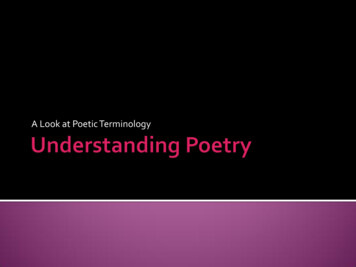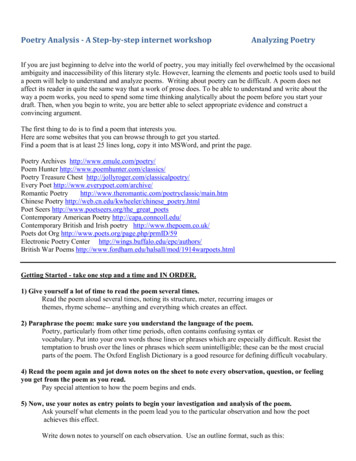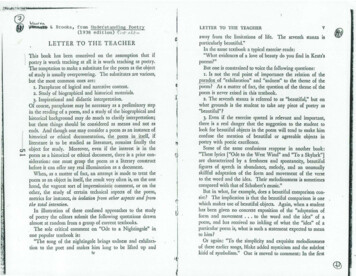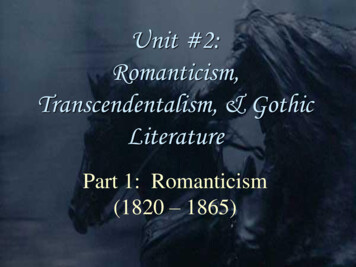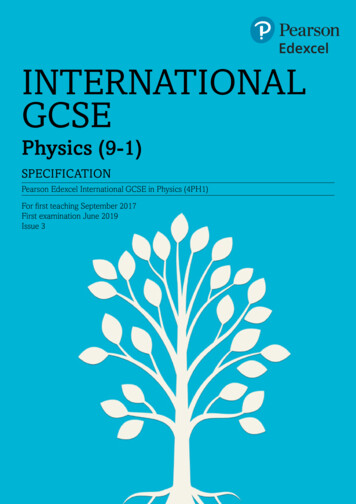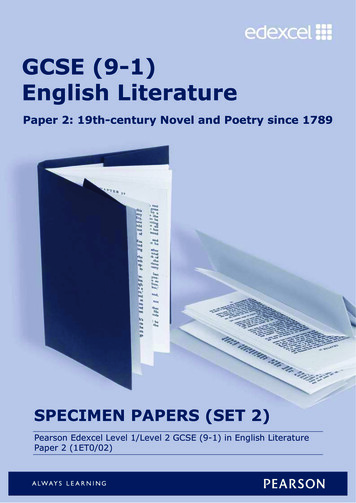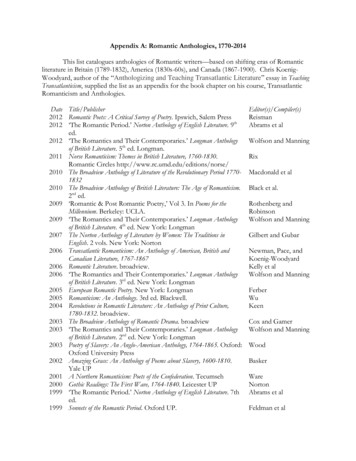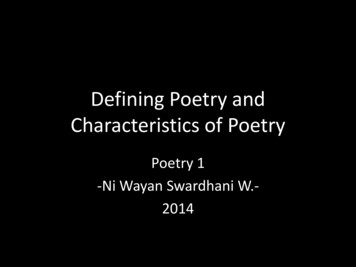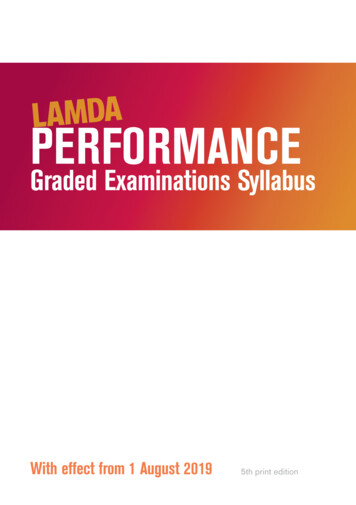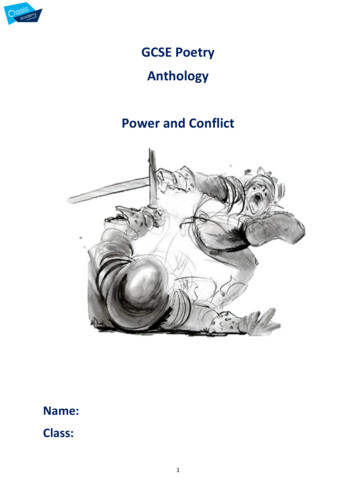
Transcription
GCSE PoetryAnthologyPower and ConflictName:Class:1
2
ContentsPoemOzymandiasPoetPercy ByssheShelleyLondonWilliam BlakeExtract from the WilliamPreludeWordsworthMy Last Duchess Robert BrowningThe Charge ofAlfred Lordthe Light Brigade TennysonExposureWilfred OwenStorm on theSeamus HeaneyIslandBayonet Charge Ted HughesRemainsSimon ArmitagePoppiesJane WeirWarCarol Ann DuffyPhotographerTissueImtiaz DharkerThe ÉmigréeCarol RumensKamikazeBeatrice GarlandChecking Out me John AgardHistory3Pages10 – 1112 – 1314 -1617 -2021 – 2324 – 2627 – 2829 - 3031 – 3233 - 3536 – 3839 – 4142 – 4344 – 4647 - 49Annotated?
4
5
Advanced poetic languagePoeticstructuresand formsMeaningRhymeThe repetition of syllable sounds – usually at the ends of lines, but sometimes inthe middle of a line (called internal rhyme).CoupletA pair of rhyming lines which follow on from one another.StanzaA group of lines separated from others in a poem.Enjambment The running over of a sentence from one line to the next without a piece of(run onpunctuation at the end of the line.lines)CaesuraA stop or a pause in a line of poetry – usually caused by punctuation.Blank verse Poetry written in non-rhyming, ten syllable lines.DramaticA poem in which an imagined speaker address the reader.monologueElegyA form of poetry which is about the death of its subject.End stopped A line of poetry ending in a piece of punctuation which results in a pause.EpigraphA quotation from another text, included in a poem.LyricAn emotional, rhyming poem, most often describing the emotions caused by aspecific event.OdeA formal poem which is written to celebrate a person, place, object or idea.ParodyA comic imitation of another writer’s work.QuatrainA four line stanza.SestetA six line stanza.SonnetA fourteen line poem, with variable rhyme scheme, usually on the topic of lovefor a person, object or situation.Free verseNon-rhyming, non-rhythmical poetry which follows the rhythms of naturalspeech.VoltaA turning point in the line of thought or argument in poem.6
Literary ContextRomantic MovementThe Romantic movement flourished in the late 18thcentury and the first half of the 19th century andcelebrated emotion, wildness and nature abovereason and science.Romantics stressed the awe of nature in art andlanguage and the experience of the sublime(something majestic, impressive or intellectuallyvaluable) through a connection with nature.A key Romantic poet, Wordsworth, summed theapproach up by stating that “all good poetry is thespontaneous overflow of powerful feelings.”7Key Romantic Poets William BlakeWilliam WordsworthSamuel Taylor ColeridgeLord ByronPercy Bysshe ShelleyJohn Keats
Ozymandiasby Percy Bysshe ShelleyContextPercy Bysshe Shelley (1792-1822 was one of a group of poets who became known as The Romantics.He came from a wealthy family and was in line to inherit both riches and his grandfather's role as an MP.He was expelled from university for writing about atheism (not believing in God) which led to him to fallout with his father who disinherited him. In the same year, 1811, he eloped and married aged 19.Shelley was well known as a 'radical' during his lifetime and some people think Ozymandias reflects thisside of his character. Although it is about the remains of a statue of Ozymandias it can be read as acriticism of people or systems that become huge and believe themselves to be invincible.Shelley’s friend the banker Horace Smith stayed with the poet in the Christmas season of 1817. Oneevening, they began to discuss recent discoveries in the Near East. In the wake of Napoleon’s conquest ofEgypt in 1798, the archeological treasures found there stimulated the European imagination. The power ofpharaonic Egypt had seemed eternal, but now this once-great empire was (and had longbeen) in ruins; a feeble shadow.The Roman-era historian Diodorus Siculus described a statue of Ozymandias, morecommonly known as Rameses II. Diodorus reports the inscription on the statue, which heclaims was the largest in Egypt, as follows: “King of Kings Ozymandias am I. If any want toknow how great I am and where I lie, let him outdo me in my work.” (The statue and itsinscription do not survive, and were not seen by Shelley.)Stimulated by their conversation, Smith and Shelley wrote sonnets based on the passage in Diodorus.Smith produced a now-forgotten poem while Shelley’s contribution was “Ozymandias,” one of the bestknown sonnets in European literature.summaryA traveller tells the poet that two huge stone legs stand in the desert. Near them on the sand lies adamaged stone head. The face is distinguished by a frown and a sneer which the sculptor carved on thefeatures. On the pedestal are inscribed the words "My name is Ozymandias, king of kings: / Look on myworks, ye Mighty, and despair!" Around the huge fragments stretches the empty desert.VocabularyVisage (noun): the form or structure of a person'sColossal (adjective): enormous in sizeface, or is a person's facial expressionWreck (noun): a ruined object or personSneer (verb): to look at someone with a disdainfulBoundless (adjective): endless; having noexpression, as though you think they are worthlessboundarySculptor (noun): a person who sculpts (builds orcreates things out of a material – ie clay)8
OzymandiasBY PERCY BYSSHE SHELLEYI met a traveller from an antique land,Who said—“Two vast and trunkless legs of stoneStand in the desert. . . . Near them, on the sand,Half sunk a shattered visage lies, whose frown,And wrinkled lip, and sneer of cold command,Tell that its sculptor well those passions readWhich yet survive, stamped on these lifeless things,The hand that mocked them, and the heart that fed;And on the pedestal, these words appear:My name is Ozymandias, King of Kings;Look on my Works, ye Mighty, and despair!Nothing beside remains. Round the decayOf that colossal Wreck, boundless and bareThe lone and level sands stretch far away.”9
London by William BlakeContextWilliam Blake was another key romantic poet. He specialised in poems of a religious nature but he rejectedestablished religion. One of the main reasons was the failure of the established Church to help children inLondon who were forced to work. Blake lived and worked in the capital, so was well placed to write clearlyabout the conditions people who lived there faced.He published a book of poems called ‘Songs of Innocence and Experience’ in 1794, this collection of poemsaimed to show the "Two Contrary States of the Human Soul". The Songs of Innocence section containspoems which are positive in tone and celebrate love, childhood and nature. The Songs of Experience poemsare obviously intended to provide a contrast, and illustrate the effects of modern life on people and nature.Dangerous industrial conditions, child labour, prostitution and poverty are just some of the topics Blakeexplores.In 1789, the French people revolted against the monarchy and aristocracy, using violence and murder tooverthrow those in power. Many saw the French Revolution as inspirational - a model for how ordinary,disadvantaged people could seize power. Blake alludes (makes subtle reference to) to the revolution in thepoem London, arguably suggesting that the experience of living there could encourage a revolution on thestreets of the capital.SummaryThe poem describes a journey around London, offering a glimpse of what the speaker sees as the terribleconditions faced by the inhabitants of the city. Child labour, restrictive laws of property and prostitution areall explored in the poem.The poem starts with a criticism of laws relating to ownership. The 'charter'd Thames' is a bitter referenceto the way in which every aspect of life in London is owned, even the river, so often in other poems asymbol of life, freedom and the power of nature.Blake's poem also criticises religion and its failures. The speaker draws attention to the cry of the chimneysweeper and the blackening of church walls, implying that the church as an institution is inactive, unwillingto help those in need. It ends with a vision of the terrible consequences to be faced as a result of sexuallytransmitted disease.VocabularyWander (verb): to walk without definite purposeChartered (adjective): to describe when anorganisation or institution is given specific rights,powers or privileges by the overall authority.Mark1)(Noun): is a sign, symbol, indication or a stain.2) (verb): to put an indication or symbol on somethingin order to identify it.3) (verb) to notice somethingWoe (noun): a feeling of deep sorrow or grief.Ban (noun): is a ruling that forcibly stops something.Forge (verb): to give form or shape to something.10Manacles (noun): handcuffsHapless (adjective): unluckyAppal (verb): to shock or amaze in a negativeway.Blight (verb): to spoil or destroy something or tocause an urban area to become run-down andneglected.plague1) (noun): a widespread disease that is deadly.2) (verb): To pester or annoy continually.hearse (noun): a funeral car (or horse drawn cartin Blake’s day)
LondonBY WILLIAM BLAKEI wander thro' each charter'd street,Near where the charter'd Thames does flow.And mark in every face I meetMarks of weakness, marks of woe.In every cry of every Man,In every Infants cry of fear,In every voice: in every ban,The mind-forg'd manacles I hearHow the Chimney-sweepers cryEvery blackning Church appalls,And the hapless Soldiers sighRuns in blood down Palace wallsBut most thro' midnight streets I hearHow the youthful Harlots curseBlasts the new-born Infants tearAnd blights with plagues the Marriage hearse11
Extract from the Prelude by William WordsworthContextWilliam Wordsworth (1770-1850) is one of the most famous poets in the history of EnglishLiterature. He was born in Cumbria, part of the region commonly known as the Lake District, and hisbirthplace had a huge influence on his writing. So did the fact that his mother died when he was onlyeight years old. His father wasn't always around, although William did use his library for reading.William spent time with his grandparents who lived in nearby Penrith, an even wilder and morerugged place.Wordsworth is believed to have started writing poetry when he was at school; during this time hewas orphaned by the death of this father.He went to Cambridge University and just before finishing his studies he set off on a walking tour ofEurope, coming into contact with the French Revolution, which influenced his writing. He fell in lovewith a French woman and she had a child. Wordsworth returned to England before his daughter,Caroline, was born and war between Britain and France meant that he didn't see his daughter or hermother for many years.In 1802, shortly after visiting his daughter in France, Wordsworth married Mary Hutchinson, a friendfrom his school days. They had five children together. 1812 was a terrible year for them as two oftheir children died.The Prelude is one of the greatest works of literature ever written in English. It is along autobiographical poem in 14 sections. The first version was written in 1798 but he continued towork on it throughout his lifetime.The poem shows the spiritual growth of the poet, how he comes to terms with who he is, and hisplace in nature and the world. Wordsworth was inspired by memories of events and visits todifferent places, explaining how they affected him. He described The Prelude as "a poem on thegrowth of my own mind" with "contrasting views of Man, Nature, and Society".SummaryThis extract describes how Wordsworth went out in a boat on a lake at night. He was alone and amountain peak loomed over him; its presence had a great effect and for days afterwards he wastroubled by the experience.VocabularyCove (noun): a small area on the beachLustily (adverb): to describe something done in ashielded by rocks.‘lusty’ manner (lusty describes someone orStealth (noun): being secretive or cautious insomething that is filled with passion, or someonemovement and actionIdly (adverb): doing something withoutpurpose.Craggy ridge (adjective noun): the rough andrugged edge of a rocky bit of land.Utmost (adjective): something that is mostimportant, most extreme or greatest.Elfin (adjective): ike an elf; tiny, delicatePinnace (noun): a small sailing shipstrong and full of vigour.)Uprear (verb): to lift upStature (noun): heightGrim (adjective): something that is so unpleasant itpushes you awayCovert (adjective): secret or hiddenSpectacle (noun): something amazing, interestingor exciting to see that attracts attention.Mode (noun): a way of doing something or acting.12
Extract from the PreludeBy William WordsworthOne summer evening (led by her) I foundA little boat tied to a willow treeWithin a rocky cove, its usual home.Straight I unloosed her chain, and stepping inPushed from the shore. It was an act of stealthAnd troubled pleasure, nor without the voiceOf mountain-echoes did my boat move on;Leaving behind her still, on either side,Small circles glittering idly in the moon,Until they melted all into one trackOf sparkling light. But now, like one who rows,Proud of his skill, to reach a chosen pointWith an unswerving line, I fixed my viewUpon the summit of a craggy ridge,The horizon’s utmost boundary; far aboveWas nothing but the stars and the grey sky.She was an elfin pinnace; lustilyI dipped my oars into the silent lake,And, as I rose upon the stroke, my boatWent heaving through the water like a swan;When, from behind that craggy steep till thenThe horizon’s bound, a huge peak, black and huge,As if with voluntary power instinct,Upreared its head. I struck and struck again,And growing still in stature the grim shape13
Towered up between me and the stars, and still,For so it seemed, with purpose of its ownAnd measured motion like a living thing,Strode after me. With trembling oars I turned,And through the silent water stole my wayBack to the covert of the willow tree;There in her mooring-place I left my bark, And through the meadows homeward went, in graveAnd serious mood; but after I had seenThat spectacle, for many days, my brainWorked with a dim and undetermined senseOf unknown modes of being; o’er my thoughtsThere hung a darkness, call it solitudeOr blank desertion. No familiar shapesRemained, no pleasant images of trees,Of sea or sky, no colours of green fields;But huge and mighty forms, that do not liveLike living men, moved slowly through the mindBy day, and were a trouble to my dreams.14
My Last Duchess by Robert BrowningContextRobert Browning (1812-1889) was heavily influenced as a youngster by his father's extensive collection ofbooks and art. His father was a bank clerk and collected thousands of books, some of which werehundreds of years old and written in languages such as Greek and Hebrew. By the time he was five, it wassaid that Browning could already read and write well. He was a big fan of the poet Shelley and asked for allof Shelley's works for his thirteenth birthday. By the age of fourteen, he'd learned Latin, Greek and French.Browning went to the University of London but left because it didn't suit him.He married fellow poet Elizabeth Barrett but they had to run away and marry in secret because of herover-protective father. They moved to Italy and had a son, Robert. Father and son moved to London whenElizabeth died in 1861.Browning is best known for his use of the dramatic monologue. My Last Duchess is an example of this andit also reflects Browning's love of history and European culture as the story is based on the life of anItalian Duke from the sixteenth century.The characters mentioned in this poem are based on real life, historical figures. The narrator is DukeAlfonso II who ruled a place in northern Italy called Ferrara between 1559 and 1597. The Duchess ofwhom he speaks was his first wife, Lucrezia de' Medici who died in 1561 aged 17, only two years after hemarried her. In real life, Lucrezia died in suspicious circumstances and might have been poisoned.SummaryThe characters mentioned in this poem are based on real life, historical figures. The narrator is DukeAlfonso II who ruled a place in northern Italy called Ferrara between 1559 and 1597. The Duchess of whomhe speaks was his first wife, Lucrezia de' Medici who died in 1561 aged 17, only two years after he marriedher. In real life, Lucrezia died in suspicious circumstances and might have been poisoned.The poem is set in 1564, three years after the death of the Duchess. An emissary (messenger orrepresentative) has been sent to see the Duke from the Count of Tyrol. The Count is the father of theDuke's next wife (he married three times in all). The Duke shows the emissary a picture of his late wife andremarks on her character, suggesting that she was unfaithful to him - and hinting that he might have killedher because of it.During his speech, the Duke makes himself look arrogant, insensitive and selfish.VocabularyCountenance (noun): the look on a face that shows expression.Earnest (adj): to describe someone or something serious and not playful.Mantle (noun): a shawl or a cloakOfficious (adj): is offering unwanted advice or services, often in an overbearing way.Trifling (adj): of little importance or worthMunificence (noun): generosityDowry (noun): the property and wealth a woman brings to a marriage in some cultures or in historictimes, or a natural talent or gift.Warrant (verb): to guarantee, assure or give someone authority to do something.15
FERRARAThat’s my last Duchess painted on the wall,Looking as if she were alive. I callThat piece a wonder, now; Fra Pandolf’s handsWorked busily a day, and there she stands.Will’t please you sit and look at her? I said“Fra Pandolf” by design, for never readStrangers like you that pictured countenance,The depth and passion of its earnest glance,But to myself they turned (since none puts byThe curtain I have drawn for you, but I)And seemed as they would ask me, if they durst,How such a glance came there; so, not the firstAre you to turn and ask thus. Sir, ’twas notHer husband’s presence only, called that spotOf joy into the Duchess’ cheek; perhapsFra Pandolf chanced to say, “Her mantle lapsOver my lady’s wrist too much,” or “PaintMust never hope to reproduce the faintHalf-flush that dies along her throat.” Such stuffWas courtesy, she thought, and cause enoughFor calling up that spot of joy. She hadA heart—how shall I say?— too soon made glad,Too easily impressed; she liked whate’erShe looked on, and her looks went everywhere.16
Sir, ’twas all one! My favour at her breast,The dropping of the daylight in the West,The bough of cherries some officious foolBroke in the orchard for her, the white muleShe rode with round the terrace—all and eachWould draw from her alike the approving speech,Or blush, at least. She thanked men—good! but thankedSomehow—I know not how—as if she rankedMy gift of a nine-hundred-years-old nameWith anybody’s gift. Who’d stoop to blameThis sort of trifling? Even had you skillIn speech—which I have not—to make your willQuite clear to such an one, and say, “Just thisOr that in you disgusts me; here you miss,Or there exceed the mark”—and if she letHerself be lessoned so, nor plainly setHer wits to yours, forsooth, and made excuse—E’en then would be some stooping; and I chooseNever to stoop. Oh, sir, she smiled, no doubt,Whene’er I passed her; but who passed withoutMuch the same smile? This grew; I gave commands;Then all smiles stopped together. There she standsAs if alive. Will’t please you rise? We’ll meetThe company below, then. I repeat,The Count your master’s known munificence17
Is ample warrant that no just pretenseOf mine for dowry will be disallowed;Though his fair daughter’s self, as I avowedAt starting, is my object. Nay, we’ll goTogether down, sir. Notice Neptune, though,Taming a sea-horse, thought a rarity,Which Claus of Innsbruck cast in bronze for me!Robert Browning18
The Charge of the Light Brigade BY ALFRED, LORD TENNYSONContextThe poet:Alfred Tennyson (1809-1892) was one of 11 children born to an upper-middle class country vicar.He received a good literary education. Alfred started writing poetry from a young age andpublished his first poems while still a student at Cambridge. In 1850 he became poet laureate. Thismeant he had to write important poems about events that affected the British nation. He held thispost until his death in 1892, making him the country's longest ever serving laureate.Historical contextThe Crimean War was fought between Britain and Imperial Russia from 1853-1856. For the firsttime in history, newspapers carried eye-witness reports as well as detailing not just the triumphsof war but the mistakes and horrors as well.The most significant moment in the Crimea came duringthe Battle of Balaclava. An order given to the British army'scavalry division (known as the Light Brigade) wasmisunderstood and 600 cavalrymen ended charging down anarrow valley straight into the fire of Russian cannons. Over150 British soldiers were killed, and more than 120 werewounded. At home the news of the disaster was a sensationand a nation that had until then embraced British militaryexploits abroad began to question the politicians and generalswho led them.SummaryThe poem tells the story of a brigade consisting of 600 soldiers who rode on horseback into the“valley of death” for half a league (about one and a half miles). They were obeying a command tocharge the enemy forces that had been seizing their guns. Not a single soldier was discouraged ordistressed by the command to charge forward, even though all the soldiers realized that theircommander had made a terrible mistake. The 600 soldiers were assaulted by the shots of shells ofcanons in front and on both sides of them. Still, they rode courageously forward toward their owndeaths. The soldiers struck the enemy gunners with their unsheathed swords (“sabres bare”) andcharged at the enemy army while the rest of the world looked on in wonder. They rode into theartillery smoke and broke through the enemy line, destroying their Cossack and Russian opponents.Then they rode back from the offensive, but they had lost many men so they were “not the sixhundred” any more.VocabularyCharge (verb): to attack with great force andspeedBrigade (noun): a unit of soldiers.League (noun): a unit of measurement; about1.5 milesDismayed (adjective): to describe someoneexperiencing a loss of courageBlundered (verb): made a big mistakeShell (noun): explosives from a large gun.Sabres (noun): swordsCossack (noun): Russian SoldierReeled (verb): fell backwards with a dizzy feelingSundered (verb): broke apart, separated or split.19
The Charge of the Light BrigadeBY ALFRED, LORD TENNYSONIHalf a league, half a league,Half a league onward,All in the valley of DeathRode the six hundred.“Forward, the Light Brigade!Charge for the guns!” he said.Into the valley of DeathRode the six hundred.II“Forward, the Light Brigade!”Was there a man dismayed?Not though the soldier knewSomeone had blundered.Theirs not to make reply,Theirs not to reason why,Theirs but to do and die.Into the valley of DeathRode the six hundred.IIICannon to right of them,Cannon to left of them,Cannon in front of themVolleyed and thundered;Stormed at with shot and shell,Boldly they rode and well,Into the jaws of Death,Into the mouth of hellRode the six hundred.20
IVFlashed all their sabres bare,Flashed as they turned in airSabring the gunners there,Charging an army, whileAll the world wondered.Plunged in the battery-smokeRight through the line they broke;Cossack and RussianReeled from the sabre strokeShattered and sundered.Then they rode back, but notNot the six hundred.VCannon to right of them,Cannon to left of them,Cannon behind themVolleyed and thundered;Stormed at with shot and shell,While horse and hero fell.They that had fought so wellCame through the jaws of Death,Back from the mouth of hell,All that was left of them,Left of six hundred.VIWhen can their glory fade?O the wild charge they made!All the world wondered.Honour the charge they made!Honour the Light Brigade,Noble six hundred!21
Exposure BY W ILFRED OW ENContextWilfred Owen (1893-1918) is one of the most famous English poets to emerge from the First WorldWar. He was born on the borders of England and Wales and was interested in becoming a poet froman early age.War broke out in 1914 and he joined the army the following year, aged 18. Before long he had toreturn to England to get treatment for shell-shock (what today we would call Post-traumatic StressDisorder – severe anxiety brought on by a stressful situation like war).He was sent to a hospital in Edinburgh and there he met the already well-known poet and writerSiegfried Sassoon. Sassoon had encouraged Owen to put more of his own personal experiences intohis poetry. He had also turned him against the war. Instead of seeing the war as a justified attemptto free Belgium, Owen now saw the war as a struggle between Imperial powers looking to expandtheir lands overseas. Owen returned to the trenches a year later and wrote some of his best-knownpoems. He was also decorated for his courage in battle, before being killed on 4th November 1918,just a week before peace was declared and the war finally ended.SummaryA company of soldiers suffers the bitter cold of anight at the front. The troops keep nervous watchduring a bitterly cold night though despite the distantsound of guns, “nothing happens”. They questionwhy they are there. Dawn brings only gloomy relief;the enemy’s bullets seem less dangerous than thesnow. In their dreams, they see a peaceful springscene though it is one from which they are excluded.Their fate is, instead, to lie out in the trenches.Tonight, the cold will claim more lives. Still nothinghappens.VocabularyWearied (adjective): tired and exhaustedShudders (verb): shiversDrooping (verb): hanging down, bendingFlock (verb): group togetherdown or to losing strength.Renew (verb): to make new, reawaken, reestablish orSalient (adjective): something that is verystart overnoticeable or is prominentNonchalance (adjective): indifference; not seeming toSentries (noun): guardscareGusts (noun): a small burst of wind.Cringe (verb) to draw back or to move your face orIncessantly (adverb): continually; withoutbody in order to shrink from danger or fear.stopping; endless.Daze (noun): a state of stunned confusion orMassing (verb): to bring together into abewilderment.mass (a large grouping)Dowse (verb): cover completely in water.Melancholy (adjective): feeling sad andGlozed : deceiveddepressedLoath (adjective): someone or something unwilling orRanks (noun): orderly linesreluctant.Successive (adjective): one after the other. Puckering (verb) to draw up into wrinkles or smallfolds.22
ExposureBY W ILFRED OW ENOur brains ache, in the merciless iced east winds that knive us . . .Wearied we keep awake because the night is silent . . .Low drooping flares confuse our memory of the salient . . .Worried by silence, sentries whisper, curious, nervous,But nothing happens.Watching, we hear the mad gusts tugging on the wire,Like twitching agonies of men among its brambles.Northward, incessantly, the flickering gunnery rumbles,Far off, like a dull rumour of some other war.What are we doing here?The poignant misery of dawn begins to grow . . .We only know war lasts, rain soaks, and clouds sag stormy.Dawn massing in the east her melancholy armyAttacks once more in ranks on shivering ranks of grey,But nothing happens.Sudden successive flights of bullets streak the silence.Less deadly than the air that shudders black with snow,With sidelong flowing flakes that flock, pause, and renew,We watch them wandering up and down the wind's nonchalance,But nothing happens.23
Pale flakes with fingering stealth come feeling for our faces—We cringe in holes, back on forgotten dreams, and stare, snow-dazed,Deep into grassier ditches. So we drowse, sun-dozed,Littered with blossoms trickling where the blackbird fusses.—Is it that we are dying?Slowly our ghosts drag home: glimpsing the sunk fires, glozedWith crusted dark-red jewels; crickets jingle there;For hours the innocent mice rejoice: the house is theirs;Shutters and doors, all closed: on us the doors are closed,—We turn back to our dying.Since we believe not otherwise can kind fires burn;Now ever suns smile true on child, or field, or fruit.For God's invincible spring our love is made afraid;Therefore, not loath, we lie out here; therefore were born,For love of God seems dying.Tonight, this frost will fasten on this mud and us,Shrivelling many hands, and puckering foreheads crisp.The burying-party, picks and shovels in shaking grasp,Pause over half-known faces. All their eyes are ice,But nothing happens.24
Storm on the Island by Seamus HeaneyContextSeamus Heaney was born in Northern Ireland in 1939, the eldest child in what was to become afamily of nine children. His father farmed 50 acres in rural County Derry and was a cattle dealer.Much of Heaney's poetry is centred on the countryside and farm life that he knew as a boy.In the 1960s he belonged to a group of poets who, he said, used to talk poetry day after day. Hehas written many collections of poetry, the first of which was published in 1966. His later workscapitalise on his knowledge of Latin, Anglo-Saxon and Gaelic and explore words and theirsignificance. His translation of Beowulf, an Old English narrative poem, was published in 1999.In 1982 he began teaching for one semester a year at Harvard University in the USA. He wasappointed Professor of Poetry at Oxford University in 1989 and was awarded the Nobel Prize forLiterature in 1995. He has lived with his family in Dublin in the Republic of Ireland since 1976.SummaryThe poem describes the experience of being in a cliff-top cottage on an island off the coast ofIreland during a storm. Heaney describes the bare ground, the sea and the wind. The people in thecottage are extremely isolated and can do nothing against the powerful and
A key Romantic poet, Wordsworth, summed the approach up by stating that all good poetry is the spontaneous overflow of powerful feelings. _ William Blake . He published a book of poems called Songs of I
